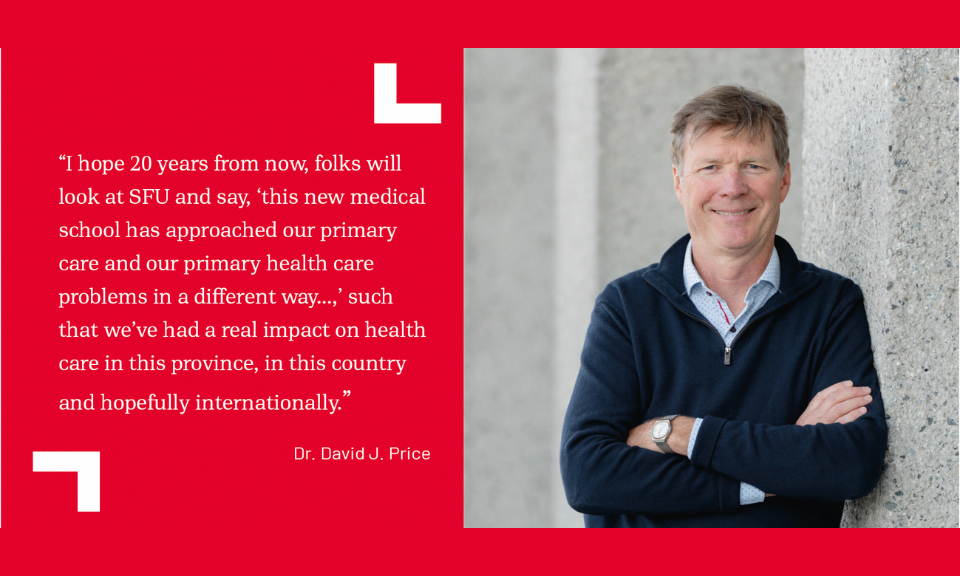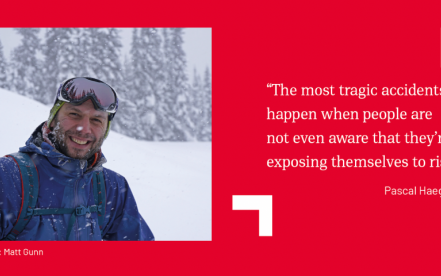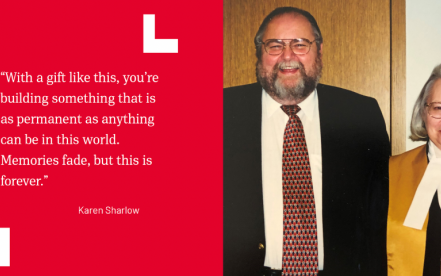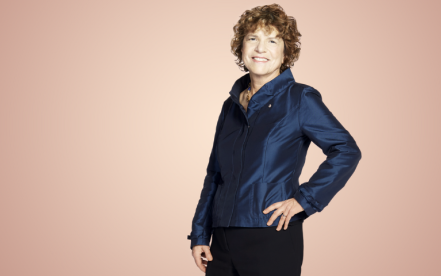Meet Dr. David J. Price, Founding Dean, SFU School of Medicine, and Special Advisor to the Provost and VP Academic

Dr. David J. Price was appointed as SFU’s founding dean of Medicine in July 2024 and had served as interim dean since September 2023. He leads a growing and diverse team establishing the first entirely new school of medicine in Western Canada in 55 years. The SFU School of Medicine will train the next generation of primary care physicians dedicated to improving the health of B.C. families across urban, rural, remote and Indigenous communities.
A practicing family physician and professor in the Department of Family Medicine at McMaster University, Dr. Price is deeply committed to fostering strong team-based environments to inspire innovative learning and research and more effective, accessible patient care.
Learn more about Dr. Price, his leadership approach, and his vision for the role that SFU can play in transforming primary health care in B.C.
What do you enjoy the most about being part of the SFU community?
When I first took on this role as the interim dean here at SFU, it was the opportunity to work with a very small team at almost the very start of the journey to create a new medical school. What I’ve really appreciated is the fact that so many of the team members are amazingly committed to the vision of this new medical school. We’ve been able to recruit staff members, associate deans and other individuals who have given deeply of their skills, vision, talents and time to contribute to the formation of this school. It is so neat being a part of that community. And I can certainly say that we’ve been embraced by the broader SFU community who have supported our project and seem to be genuinely excited about bringing a medical school to this university. Building something like this is just such an amazing privilege.
From your perspective, what impact can donors and alumni have by investing in the new School of Medicine?
Donors and philanthropists who contribute to the school really add to its richness—whether that’s enhanced student support, whether that’s enabling First Nation students to go back to their own home territories and home communities to have electives, whether that’s endowed chairs to allow us to recruit experts and researchers from across Canada and around North America or internationally. SFU’s tremendous donor community is critical to helping us achieve our mission of serving our community, both from the clinical point of view as well as advancing knowledge to inform policy and practice.
What is the most important lesson you have learned that informs your leadership approach?
For me, what’s really quite clear is the ability to work with the team around you, to build that team and to support them and, while leading and helping to set the vision and direction, not being so fixated on the direction or the vision such that we can’t course correct based on input from the team and from the community that we’re working with. It’s really about the relationships with the people and community that are the critical success factors.
What is the biggest barrier to equitable health care in this province today?
We won’t reach equitable health care until we embrace fully team-based care, integrating health care professionals from all parts of the primary care sector, whether that’s pharmacists in the community, whether that’s nurse practitioners, nurses, social workers, dieticians, rehab medicine specialists, physician assistants, etc. Until we figure out that we need everybody working as a team and working collaboratively in an integrated fashion, I know we’re going to have a variety of experiences in terms of equitable access to care. It’s going to take a fundamental reset in how we practice primary care and how we structure primary care. That’s where the opportunity for our School of Medicine lies—to help inform policy by understanding what the models are that have worked around the world and modifying them so that they’re a made in British Columbia solution, fit for purpose.
What role do you want the School of Medicine to play in advancing Indigenous health?
The partnership between the First Nations Health Authority and the various Indigenous communities not only in Fraser Health but across British Columbia is going to be critical to the success of the SFU School of Medicine. We recognize that having a solid, meaningful and respectful partnership is the only way that we are going to advance Indigenous health. Recent studies have shown a decrease in the lifespan of individuals within the Indigenous community in this province. We know that they are disproportionately affected, we know that they’ve experienced racism, we know that they’ve experienced harms on behalf of the medical system or because of the medical system. For me, if we can start to not only train students who are culturally aware, who understand the specific challenges of Indigenous communities that we serve and how to work with them and how to be partners, how to be allies, then we’ll have started that step towards Reconciliation. I have no illusion that we’re going to single-handedly solve all the health disparities. But I think we can contribute to the journey to rectifying that.
What do you hope the School of Medicine will contribute to health care research and innovation?
I hope 20 years from now, folks will look at SFU and say, ‘this new medical school has approached our primary care and our primary health care problems in a different way. They have created the kind of knowledge that has allowed us to see the problems in our communities maybe a bit differently and approach them a bit differently,’ such that we’ve had a real impact on health care in this province, in this country and hopefully internationally.


